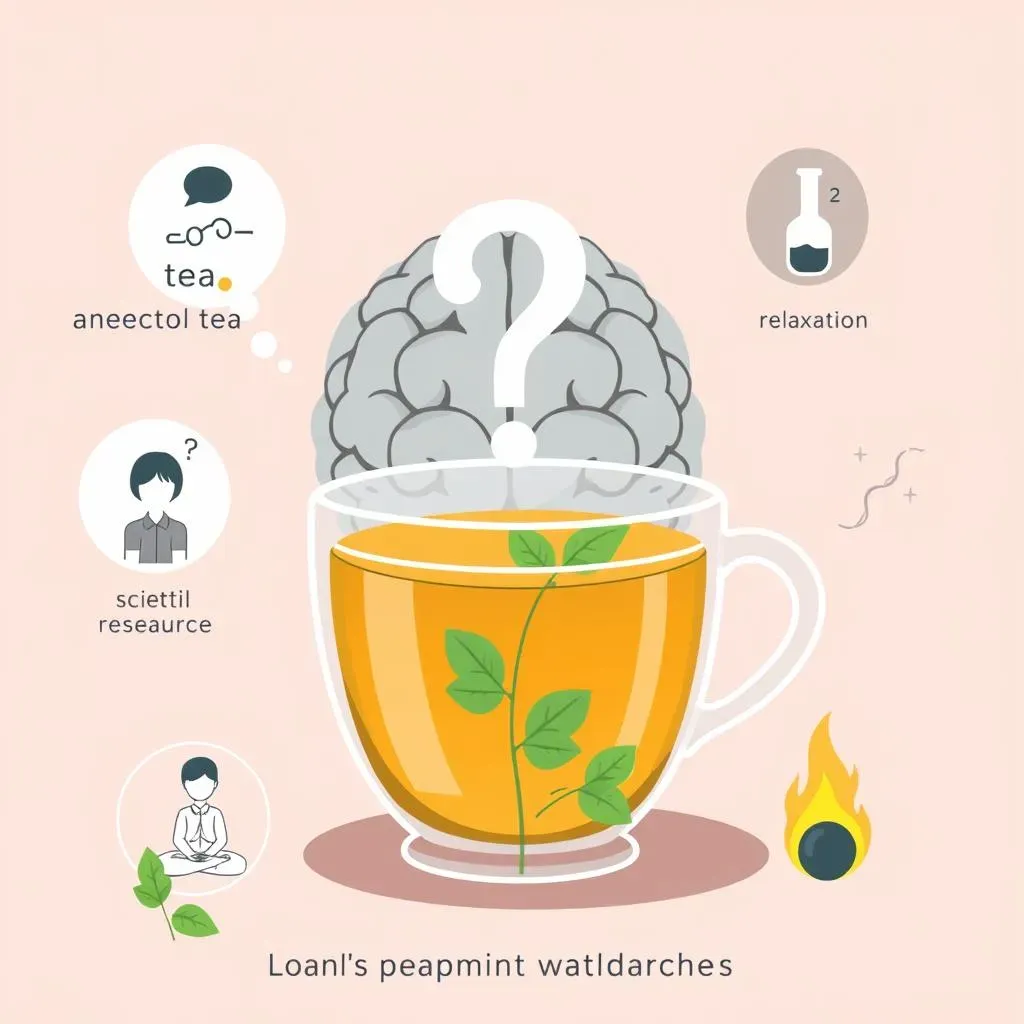Table of Contents
Headaches—that throbbing, pounding pain that can derail your day. We've all been there. While over-the-counter medications offer a quick fix, many are searching for natural alternatives. Enter spearmint tea for headaches, a remedy gaining popularity for its potential to soothe away the discomfort. But does it really work? This article explores the science and tradition behind using spearmint tea for headaches. We'll investigate the properties of spearmint that might offer headache relief, examining its anti-inflammatory and relaxing effects. We’ll also discuss how to prepare and drink spearmint tea effectively for optimal results and explore any potential precautions you should be aware of before incorporating it into your headache-relief routine. Get ready to discover if this fragrant brew could be the natural solution you've been looking for! Let's dive into the world of spearmint tea for headaches and uncover the truth.
Does Spearmint Tea Really Help Headaches?
Does Spearmint Tea Really Help Headaches?
The Anecdotal Evidence
Let's be honest, plenty of people swear by spearmint tea for headaches. You'll find countless online testimonials and forum posts from folks who claim it's their go-to natural remedy. They rave about its soothing effects, describing how the warm cup helps them relax and ease the tension associated with headaches. It's important to remember that these are personal experiences, not scientific proof. While anecdotal evidence can be a starting point, it's not enough to definitively say spearmint tea cures headaches. Think of it like this: your friend might say their lucky socks help them win at basketball, but that doesn't mean the socks are magically responsible for their success!
However, before we dismiss these experiences entirely, it's worth considering the placebo effect. The act of drinking a warm, comforting beverage, believing it will help, can sometimes have a real impact on pain perception. A positive mental attitude can be surprisingly powerful. To get more information about calming effects of spearmint tea, read our post on spearmint tea for stress relief.
Type of Evidence | Strength of Evidence | Limitations |
|---|---|---|
Anecdotal | Weak | Subjective, no control group |
The Scientific Perspective
Now, let's look at what science has to say. While there isn't a mountain of research directly linking spearmint tea to headache relief, some studies hint at potential mechanisms. Spearmint contains compounds with anti-inflammatory properties. Inflammation can contribute to headaches, so reducing it *could* indirectly lessen headache pain. It's also believed that spearmint's relaxing properties might help ease tension headaches, which are often caused by muscle tension in the neck and shoulders. Think of it like gently unwinding a tight knot.
However, the research is still pretty limited. Most studies focus on other potential benefits of spearmint, such as improving digestion or hormonal balance. More research is definitely needed to confirm whether spearmint tea is a truly effective headache treatment. For more insights into spearmint's impact on your gut, check out our article on the benefits of spearmint tea for digestion.
- Limited direct research on headache relief
- Potential anti-inflammatory effects
- Possible relaxation benefits for tension headaches
Understanding Spearmint Tea and its Properties for Headache Relief
Understanding Spearmint Tea and its Properties for Headache Relief
Understanding Spearmint's Headache-Fighting Potential
So, you're curious about spearmint tea and its potential to help with headaches? Let's unpack what makes this minty beverage tick. Spearmint isn't just a pretty face (or a delicious flavor in your gum); it packs a punch of beneficial compounds. One key player is its essential oil, brimming with things like limonene and carvone. These aren't just fancy chemical names; they're the active ingredients believed to contribute to spearmint's potential anti-inflammatory and pain-relieving effects. Inflammation, you see, is often a sneaky culprit behind headaches, especially tension headaches. By potentially reducing inflammation, spearmint might help ease the pain.
Beyond inflammation, spearmint also has a reputation for its relaxing properties. Think of that calming feeling you get after a nice cup of tea – that’s partly thanks to the gentle effects of the plant’s compounds. This relaxation can be particularly helpful for tension headaches, which often stem from muscle tightness in your neck and shoulders. It's like giving those tense muscles a gentle hug. For more on spearmint's relaxing effects, you can learn more about spearmint tea for stress relief. Remember, though, that while these properties are promising, more research is needed to fully understand how effective spearmint tea is for headache relief.
- Limonene
- Carvone
- Anti-inflammatory properties
- Relaxing effects
Exploring the Science Behind Spearmint's Effects
Now, let’s talk science. While we don't have a ton of studies directly linking spearmint tea to headache relief, the existing research is intriguing. One study suggested that spearmint might help regulate hormones, which could be beneficial for some types of headaches linked to hormonal fluctuations. Another study indicated that spearmint might have an impact on inflammation, which, as we discussed, can play a role in headache development. This isn't to say spearmint tea is a guaranteed cure-all; it suggests avenues for further research.
It's important to remember that correlation doesn't equal causation. Just because spearmint seems to help some people doesn't automatically mean it's the *cause* of their headache relief. There could be other factors at play, such as lifestyle changes or the placebo effect. However, the hints of anti-inflammatory and relaxing effects in the research are worth noting. To delve deeper into spearmint's impact on digestion, check out our article on spearmint tea's digestive benefits.
Compound | Potential Effect | Evidence Level |
|---|---|---|
Limonene | Anti-inflammatory | Moderate |
Carvone | Relaxation | Moderate |
Using Spearmint Tea for Headaches: Tips and Precautions
Using Spearmint Tea for Headaches: Tips and Precautions
Brewing the Perfect Cup
So, you're ready to give spearmint tea a try for your headaches? Great! Let's talk technique. First, you'll need good quality dried spearmint leaves or a high-quality spearmint tea bag. Avoid anything with added flavors or sweeteners, as these could irritate your headache or mask the effects of the spearmint itself. For a truly authentic experience, use fresh spearmint leaves if you can get your hands on them—just be sure to wash them thoroughly before brewing. The ideal water temperature is around 200°F (93°C). Steeping the leaves for 5-7 minutes will extract the maximum amount of beneficial compounds.
Don't be afraid to experiment with the strength of your brew. Some people find a stronger brew more effective, while others prefer a milder taste. Remember, consistency is key. If you decide to try spearmint tea for headache relief, make it a regular part of your routine, rather than just resorting to it when you have a headache. Regular intake might help prevent headaches from occurring in the first place. For more information on stress reduction with spearmint tea, check out our article on stress relief with spearmint tea.
- Use high-quality spearmint leaves or tea bags.
- Use fresh leaves if possible.
- Steep for 5-7 minutes in 200°F (93°C) water.
- Experiment with brew strength.
- Drink regularly for potential preventative effects.
Potential Side Effects and Precautions
While spearmint tea is generally considered safe, it's always wise to be aware of potential side effects and precautions. In large amounts, spearmint might affect hormone levels, so it's particularly important for pregnant women to talk to their doctor before regularly consuming spearmint tea. Also, some individuals might experience mild digestive upset, such as heartburn or nausea. If you have any pre-existing health conditions, particularly liver or kidney issues, it’s advisable to consult with your doctor before introducing spearmint tea into your routine. They can help determine if it's a safe addition for your specific circumstances.
Remember, spearmint tea isn't a magical cure-all for headaches. While it might offer some relief for certain types of headaches, it's not a replacement for medical advice. If your headaches are severe, persistent, or accompanied by other symptoms, it's vital to see a doctor. They can help diagnose the underlying cause and recommend appropriate treatment. For a deeper understanding of spearmint's role in digestion, read our post on the benefits of spearmint tea for digestion.
Caution | Who Should Be Cautious? |
|---|---|
Hormonal effects | Pregnant women |
Digestive upset | Individuals with sensitive stomachs |
Liver/kidney issues | Those with pre-existing conditions |
